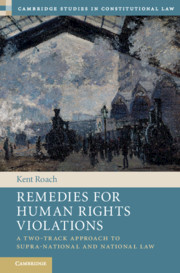Book contents
- Remedies for Human Rights Violations
- Cambridge Studies in Constitutional Law
- Remedies for Human Rights Violations
- Copyright page
- Brief Contents
- Contents
- Acknowledgements
- Table of Cases
- 1 The Importance and Complexity of Remedies
- 2 A Two-Track Approach to Individual and Systemic Remedies
- 3 Interim Remedies
- 4 Remedies for Laws That Violate Human Rights
- 5 Damages
- 6 Remedies in the Criminal Process
- 7 Declarations, Injunctions and the Declaration Plus
- 8 Remedies for Social, Economic and Cultural Rights
- 9 Remedies for Violations of Indigenous Rights
- 10 Conclusion
- Select Bibliography
- Index
7 - Declarations, Injunctions and the Declaration Plus
Published online by Cambridge University Press: 29 March 2021
- Remedies for Human Rights Violations
- Cambridge Studies in Constitutional Law
- Remedies for Human Rights Violations
- Copyright page
- Brief Contents
- Contents
- Acknowledgements
- Table of Cases
- 1 The Importance and Complexity of Remedies
- 2 A Two-Track Approach to Individual and Systemic Remedies
- 3 Interim Remedies
- 4 Remedies for Laws That Violate Human Rights
- 5 Damages
- 6 Remedies in the Criminal Process
- 7 Declarations, Injunctions and the Declaration Plus
- 8 Remedies for Social, Economic and Cultural Rights
- 9 Remedies for Violations of Indigenous Rights
- 10 Conclusion
- Select Bibliography
- Index
Summary
This chapter examines declarations and injunctions in complex cases involving institutions that violate human rights. Part I examines American and Indian public law litigation suggesting that in many cases, courts focus only on systemic remedies whereas supra-national regional human rights courts often combine both individual and systemic remedies. Part II argues that courts can deal with complex cases in a manner consistent with the separation of powers if they provide individual remedies while being more cautious and dialogic with respect to systemic remedies. Negotiation, mediation and broad public participation can help resolve the complexities of polycentric issues. Part III argues that a new remedy called the “declaration plus” allows courts to avoid premature use of detailed injunctions enforceable through contempt while still retaining jurisdiction. A few Canadian cases and supra-national courts follow the declaration plus model. Part IV argues that the two-track approach allows courts to achieve some remedial success by ordering individual remedies while still retaining jurisdiction and engaging in the difficult project of systemic reform. Domestic courts should be more willing to retain jurisdiction, order individual remedies and re-evaluate their approach when systemic reforms fail to prevent violations.
Keywords
- Type
- Chapter
- Information
- Remedies for Human Rights ViolationsA Two-Track Approach to Supra-national and National Law, pp. 352 - 407Publisher: Cambridge University PressPrint publication year: 2021



